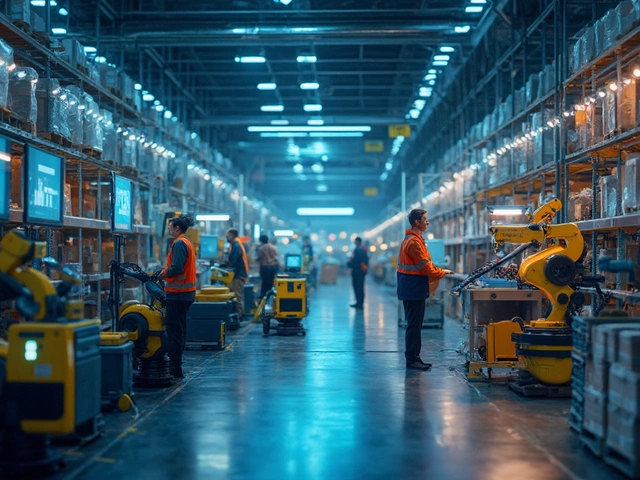Logistics jobs play a crucial role in the intricate dance of getting products from one place to another. Whether it's ensuring the phone in your hand or the fresh apples on your table, logistics professionals are behind every successful delivery.
The field demands a careful balance of planning, flexibility, and problem-solving. Logistics workers are the backbone of supply chains, orchestrating storage, transportation, and delivery while handling any hiccups that may arise. It’s not just about moving goods; it's about perfecting the art of timing and efficiency.
The industry's landscape is continually shifting with technological advancements and global market changes. This dynamic nature offers not just challenges but also abundant growth opportunities, keeping logistics professionals on their toes as they adapt and innovate.
- Understanding the Basics
- The Daily Hustle
- Tools of the Trade
- Overcoming the Hurdles
- Growth Opportunities
- Is This Career Right for You?
Understanding the Basics
Embarking on a career in logistics often starts with grasping the fundamental elements that make the industry tick. At its core, logistics is about managing the flow of goods, services, and information from the point of origin to the point of consumption efficiently and effectively. This vast field encompasses various sectors including transportation, warehousing, inventory management, and supply chain coordination. Each of these components requires an understanding of systematic processes and precise timing to work smoothly together. Logistics professionals need to think of themselves as the conductors of an orchestra, ensuring every instrument plays its part in perfect harmony to achieve the final masterpiece—a customer receiving their product on time.
The logistics industry is a substantial contributor to the global economy, with the demand for logistics jobs continuing to rise as businesses expand their reach across borders. A study by the Bureau of Labor Statistics anticipates employment in logistics will grow 28% this decade, much faster than the average for all occupations. This growth is driven by globalization and technological advances that have transformed traditional supply chains into intricate networks. For someone stepping into this arena, it's essential to understand how goods move from suppliers to manufacturers to consumers, a journey that requires meticulous planning and execution.
In logistics, one must be familiar with terms like just-in-time (JIT) inventory, which ensures goods arrive exactly when they are needed, reducing waste and increasing efficiency. On the other hand, there is the economic order quantity (EOQ) model, a mathematical formula used to determine the optimal order quantity that minimizes total inventory cost. Understanding these concepts is key, as they illustrate the delicate balance logistics professionals must maintain between supply and demand, inventory levels, and cost efficiency.
Communication is another cornerstone of a successful career in logistics. Professionals must interact with suppliers, customers, and team members, ensuring the supply chain moves seamlessly. A logistician often plays the role of a troubleshooter, resolving unexpected issues like delays or disruptions. This requires adept communication skills and the ability to make quick, informed decisions. As famed management consultant and author Peter Drucker once noted, "The productivity of work is not the responsibility of the worker but of the manager," emphasizing the importance of strong leadership in logistics.
Another critical piece in understanding logistics is the adoption of technology. From sophisticated transportation management systems (TMS) to automated warehouses, technology enhances efficiency and reduces human errors. With the rise of e-commerce giants, real-time tracking and data analytics have become indispensable tools, helping logisticians predict trends and align strategies accordingly. It's important to stay abreast of technological trends to remain competitive in the industry.
Lastly, logistics is a field where no single day mirrors another. The unpredictability of logistics presents both challenges and opportunities for innovation and growth. For those who thrive in dynamic, fast-paced environments, the exciting prospects of continuous learning and adaptation make logistics a rewarding field. Whether it’s the thrill of solving logistical puzzles or the satisfaction of a plan well-executed, logistics offers diverse roles to explore and master.
The Daily Hustle
In the bustling world of logistics jobs, no two days are ever quite the same. The day often starts early, with logistics professionals diving straight into their roles the moment the sun peeks over the horizon. Their responsibilities include monitoring delivery schedules, liaising with suppliers and clients, and resolving transportation hurdles that can often crop up unexpectedly. It's a fast-paced environment where quick thinking and efficient decision-making are crucial to keep the wheels of supply chains turning smoothly.
Individuals in this field must possess a strong sense of organization and the ability to multitask. They often juggle several projects at once, each with different priorities and deadlines, making it essential to think on their feet. Technology plays a pivotal role in managing this chaos, with software platforms that track everything from warehouse inventory to real-time delivery routes. Still, technology is merely a tool, and the ultimate responsibility falls on human shoulders to interpret the data accurately and make informed decisions that ensure the timely and cost-effective delivery of goods.
Interestingly, a significant part of any logistics job is about expecting the unexpected. Suppliers may shut down, routes can get blocked, and shipments might miss their scheduled time—all challenging scenarios that need immediate attention. As highlighted by industry expert John Smith in his article for Logistics Today, "A career in logistics requires one to be a translator of the unforeseen, turning chaos into a streamlined process by addressing disruptions head-on and with creative solutions." Such challenges demand not only technical and analytical skills but also interpersonal abilities to communicate effectively with different stakeholders across the chain.
Keeping up with the fast-paced nature of logistics also means continually learning and adapting. Professionals in the field often attend workshops and courses aimed at upgrading their skill sets, particularly with developments in digital logistics solutions. This is critical because automation is changing the landscape of logistics, making some tasks more streamlined while introducing newer complexities that require novel approaches and ingenuity. Interestingly, this adaptation extends beyond technical skills, as understanding cultural nuances becomes crucial when dealing with international supply chains, requiring professionals to have a global mindset.
Despite the daunting demand for constant adaptability and quick thinking, the rewards of a career in the logistics sector are many. Professionals enjoy a profound sense of accomplishment from seeing projects through from start to finish. They often describe the unique satisfaction of overcoming complex logistical puzzles and contributing to the seamless flow of commerce. For those who thrive in dynamic environments and can keep up with the daily hustle, logistics offers an enriching and fruitful career path that promises both personal and professional growth.

Tools of the Trade
The world of logistics is a highly orchestrated domain, requiring a range of specialized tools and technologies to function smoothly. These tools not only streamline operations but also provide logistics professionals with the critical data they need to make informed decisions and manage complex supply chains efficiently. At the heart of logistics technology is the Transportation Management System (TMS), a platform that enables logistics teams to plan, execute, and optimize the movement of goods, ensuring that shipments are both timely and cost-effective. TMS solutions offer real-time tracking, route optimization, load consolidation, and freight auditing, making them indispensable in the modern logistics landscape.
An equally critical component of the logistics job toolkit is the Warehouse Management System (WMS). This software facilitates the management of inventory and warehouse operations, guiding logistics staff in receiving, storing, and shipping products with precision. The advent of automation within WMS has seen tasks such as order picking and inventory counting being handled by robots and drones, enhancing accuracy and speed. Innovations in technology have propelled these systems into the digital age, providing mobile accessibility and cloud-based integration, which allow employees to manage operations from virtually anywhere.
Additionally, embracing Internet of Things (IoT) devices has proven to be revolutionary in logistics. Sensors and IoT devices are interconnected on a network, collecting data crucial for maintaining the integrity and quality of products, particularly in sectors such as pharmaceuticals and perishables where conditions like temperature need constant monitoring. IoT enhances visibility across the supply chain, offering real-time insights into the location and status of shipments, thus enabling immediate response to any disruptions.
Emerging Technologies and Innovations
In a rapidly evolving industry, logistics must keep pace with continually emerging technologies. Artificial Intelligence (AI) and Machine Learning (ML) algorithms analyze massive datasets for pattern recognition, predicting demand and optimizing resource allocation. This forecasting capability is invaluable in logistics companies seeking to minimize shortages and reduce costs. Companies are also exploring blockchain technology for its potential to enhance transparency and security in supply chains by providing a tamper-proof ledger of transactions and movements.
Yet, in the midst of this technological whirlwind, the human element remains vital. While tools provide precision and efficiency, it's the skilled professionals who interpret data, make strategic decisions, and navigate the nuances of human interaction that define career in logistics. The balance of technology and human expertise is crucial in adapting to customer needs and market demands, ensuring that the logistics sector continues to thrive.
The incorporation of these various tools and technologies offers logistics professionals robust support, allowing for enhanced decision-making and improved efficiencies. However, it is important to remember that each tool is as effective as the hands that wield it, underlining the importance of comprehensive training and adaptation to these technological aids. As the world continues to globalize and technology advances, the logistics field will undoubtedly evolve, presenting new tools and opportunities for those who pursue this rewarding, yet challenging path.
Overcoming the Hurdles
Working in a logistics job comes with its fair share of challenges. The field is constantly evolving, keeping professionals on their toes with unforeseen obstacles and changes that need to be addressed in a timely manner. One of the key hurdles in logistics is dealing with disruptions in the supply chain. These disruptions can range from natural disasters, political decisions, to unexpected demand shifts. Logistics professionals need to anticipate possible risks and have contingency plans in place to ensure smooth operations despite the unexpected. Developing these plans requires deep understanding of both local and global factors that might affect the flow of goods.
Another challenge is maintaining the balance between cost-efficiency and service quality. Often, cutting costs can seem appealing, but it might compromise the quality of service and customer satisfaction. This is where strategic planning becomes crucial, as logistics professionals must look for innovative ways to reduce expenses without affecting the delivery experience. The advent of technology like AI and automation has been a game-changer here, offering new avenues for optimization and efficiency, tackling even complex logistics challenges. It’s a fine line to navigate, requiring analytical skills and a clear understanding of customer expectations.
Handling Human Element
The human element cannot be overlooked when discussing logistics hurdles. Whether it's managing a team of drivers or warehouse workers, human resource issues such as communication gaps, labor disputes, or training deficiencies can impact the entire logistics process. Effective leadership and communication strategies are essential to resolve these issues swiftly. In 2022, a study from McKinsey highlighted how essential employee engagement is to the success of logistics operations. An engaged team is more productive, innovative, and committed to achieving organizational goals.
Adapting to technological advancements is another significant hurdle. The logistics industry is rapidly shifting with new tech and automation aiming to streamline processes. However, integrating these new systems requires training and a mindset shift among employees. Training programs must be comprehensive and continuous to really take advantage of new tools that come into play. As reported in the Logistics Technology & Connectivity Report 2023, over 75% of logistics firms aimed to invest in tech upgrades in the coming years, emphasizing the pressing nature of staying current with tech trends.
Lastly, environmental concerns have increasingly pressured logistics professionals to incorporate sustainable practices. This isn’t just about reducing carbon footprints but also about meeting regulatory demands and consumer expectations. Companies are exploring eco-friendly transportation modes and implementing green storage solutions. These changes are not always straightforward, requiring a clever logistical strategy and sometimes a revamping of traditional methods.

Growth Opportunities
For those venturing into the world of logistics, the potential for career advancement is substantial. Over the past decade, logistics has transformed significantly due, in large part, to technological advancements and the globalization of supply chains. Professionals who are skilled in navigating these changes may find themselves on a promising career path with a variety of roles emerging around logistics management, technology integration, and supply chain optimization.
A major catalyst for growth in the logistics industry is the increased digitization of operations. Technologies like artificial intelligence, blockchain, and IoT sensors are paving the way for 'smart' logistics systems that are efficient, reliable, and fast. This evolution creates a demand for tech-savvy professionals who can manage and implement these innovations effectively. Companies are increasingly searching for individuals who not only understand logistics fundamentals but can also merge these with cutting-edge technology, leading to the birth of roles such as logistics technology specialists and supply chain analysts.
The burgeoning e-commerce sector has raised the stakes in logistics operations to unprecedented levels. As online retailers strive to meet consumer expectations for speed and reliability, logistics professionals are at the forefront, developing innovative strategies to optimize delivery preformance. Individuals skilled in the nuances of e-commerce logistics find themselves indispensable, often climbing the professional ladder quickly as their expertise becomes more crucial to a company's success.
Moreover, the field of green logistics offers unique opportunities for growth. Companies are leaning towards sustainable practices, spurred by both environmental advocacy and consumer demand. This shift in focus brings about positions centered around sustainability and eco-friendly logistics solutions, with professionals tasked with reducing carbon footprints and enhancing energy efficiency within the supply chain.
"Logistics managers who can effectively integrate sustainability into their supply chain operations are invaluable assets," noted Dr. Lucy Hart, a prominent figure in logistics research, during a recent conference on sustainable business practices.
| Role | Median Salary (2024) | Projected Growth (% 2025-2030) |
|---|---|---|
| Logistics Analyst | $65,500 | 10% |
| Supply Chain Manager | $97,420 | 8% |
| Operations Research Analyst | $82,360 | 25% |
Logistics careers are often well-compensated, reflecting the critical nature of the work involved. As illustrated in the table above, roles like logistics analysts and supply chain managers boast competitive salaries and promising growth rates. The industry's focus on efficiency and innovation continually spins off new careers, popping up in response to evolving market needs.
For aspiring professionals, a career in logistics promises a dynamic and rewarding journey. Constant learning and adaptability are key, as the winds of technology and global commerce shift rapidly. As logistics professionals contribute to and ride these waves of change, the scope for advancement and the thrill of innovation make this an attractive avenue for those up to the challenge.
Is This Career Right for You?
Choosing a career in logistics can be both a daunting and exciting proposition. It's a realm where the perfect blend of strategic thinking and efficient execution is the key to success. If you're someone who thrives in a fast-paced environment, has a knack for problem-solving and enjoys the challenge of coordinating complex operations, this could very well be your calling. Logistics roles often require individuals to be on their toes, as they liaise with multiple stakeholders including suppliers, transporters, and clients to ensure everything runs smoothly and on time.
The workload can vary significantly from day to day, and being adept at multitasking is a substantial advantage. Often under time constraints and fluctuating priorities, you would need excellent organizational and time management skills to excel. One of the main attractions of a career in logistics is its variety; no two days are the same, which can be both a challenge and a source of motivation depending on your personal career aspirations and tolerance for unpredictability.
Logistics plays a crucial role in the supply chain ecosystem, and understanding its impact can unveil immense job satisfaction. A strong desire to contribute positively to this ecosystem can drive your enthusiasm and commitment in a logistics job. According to a 2023 report by the Bureau of Labor Statistics, logistics jobs are expected to grow by 4% over the next decade. This steady growth indicates the increasing importance and stability of employment in the field.
"Logistics is the ball game. It's about speed, efficiency, and the relentless pursuit of improving supply chain processes," says William Choi, logistics manager at Global Freight Solutions.
If you enjoy working in collaborative environments, you'll find logistics jobs to be particularly rewarding. Given the industry's rapid expansion paired with technological advancement, many logistics companies encourage teamwork and are keen on fostering talent that works effectively in groups. Being tech-savvy is advantageous, as the industry integrates more sophisticated software and automation including AI and machine learning to streamline operations. Mastery of these tools can not only enhance individual performance but also further the team’s success, aligning your personal growth with the company's objectives.
Ultimately, a career in logistics demands resilience, logistical skills, and the enthusiasm to face new daily challenges. If attributes like adaptability, an analytical mindset, and a proactive attitude are in your repertoire, you might find this path both fulfilling and fruitful. Reflecting on your personal strengths and aligning them with the industry's demands is a productive step. Like any profession, knowing yourself and what you bring to the table will help you navigate the hustling world of logistics successfully.





